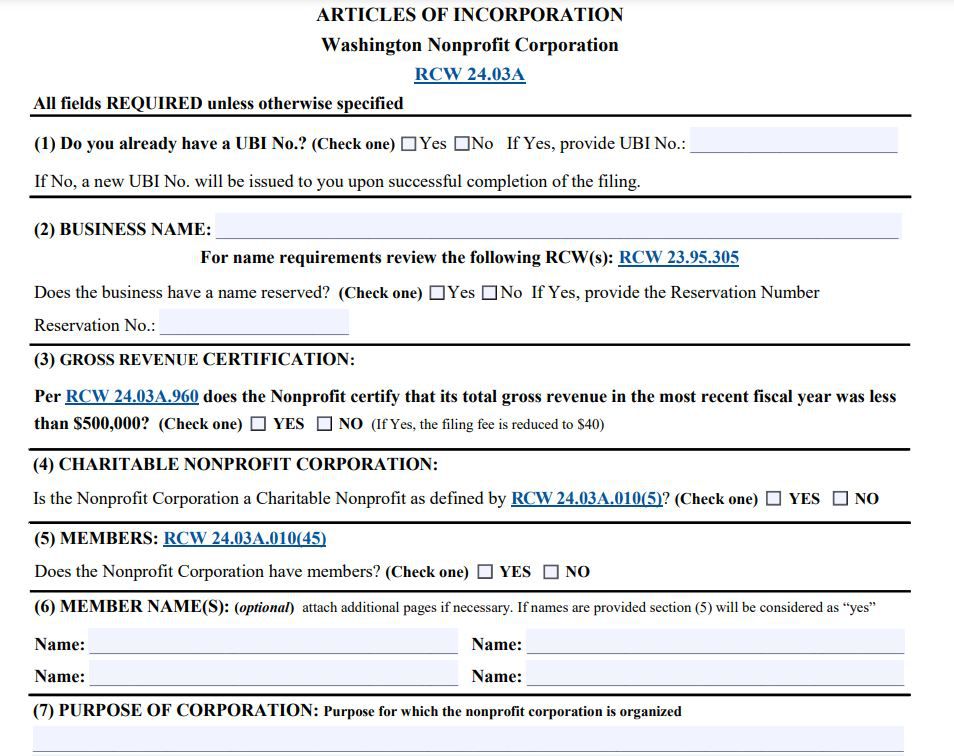Starting a business often involves a complex mix of legal documents and administrative processes. Among these, articles of incorporation play a vital role in officially establishing a corporation. However, do articles of incorporation need to be notarized like other legal documents?
This article will address this query in detail. We’ll guide you through the role of notaries in the process and why notarization might or might not be necessary depending on your jurisdiction!
Read as well: What is a notarial certificate?
Do articles of incorporation need to be notarized?
It depends on your state. As a rule, they don’t, but notarization is a pillar of credibility we deeply recommend you seek: it safeguards against forgery or fraud in legal and financial transactions, after all.

Articles of incorporation (read our complete guide here) sometimes referred to as a certificate of incorporation or corporate charter, are legal documents filed with a government agency – typically the Secretary of State – when a business entity is formed as a corporation. These documents outline key details about the corporation, including:
- Name of the corporation: The official name under which the company will operate.
- Purpose of the corporation: The reason for the corporation’s existence, whether it’s for profit or a nonprofit organization.
- Registered agent: The person or entity authorized to receive legal documents on behalf of the corporation.
- Corporate structure: Information about the board of directors, initial incorporators, and stock details.
Filing articles of incorporation officially establishes the corporation as a legal entity, separating it from its owners in terms of liability and tax obligations. In the U.S., this is a vital step for anyone planning to structure their business as a corporation.
Which means…
The requirement for notarizing articles of incorporation depends largely on the laws of the state or jurisdiction where the corporation is being established. Some states mandate notarization to ensure the document’s legitimacy, while others do not require it as part of the filing process.
In certain jurisdictions, articles of incorporation must be notarized before submission. This extra step adds a layer of verification, ensuring that the document is authentic and the signatures are valid.
- States like Florida, Mississippi, and Louisiana, for example, have laws requiring notarization for incorporation documents.
- Other states, such as California and Texas, do not require notarization for articles of incorporation. Instead, these states rely on other verification methods, such as electronic submissions and digital signatures, to validate the filing.

General best practices
Even in states where notarization isn’t mandatory, though, incorporating parties often choose to have their articles notarized as a precautionary measure. Doing so can:
- Avoid delays or rejection due to incomplete documentation;
- Serve as evidence in case of future legal disputes;
- Establish an additional layer of professionalism and legitimacy.
Learn how to amend articles of incorporation in 5 steps today.
Why you should speak to a local notary first and foremost
To determine whether your articles of incorporation need to be notarized, consulting a notary public – a licensed official authorized to witness the signing of important documents, verify the identity of signers, and ensure the process is free from fraud or coercion – is key. Their roles include:
- Authentication: verifying the identities of the parties involved using government-issued identification.
- Witnessing: observing the signing of documents to ensure all parties willingly participate.
- Certifying: after the signing, the notary affixes a seal and signature to certify the authenticity of the document.
Even if your state doesn’t mandate notarization, opting to notarize your articles of incorporation offers invaluable advantages that enhance security, credibility, and legal standing, as such professionals would tell you. Here’s why notarization is always worth considering:

1. Fraud prevention and identity verification
Notarization acts as a robust safeguard against fraud, ensuring that every individual involved in the incorporation process is properly identified. By requiring signers to present valid government-issued identification, a notary verifies their identities and prevents instances of forgery, identity theft, or unauthorized signatures. This added layer of scrutiny protects your corporation from potential legal challenges rooted in fraudulent documentation.
2. Boosted credibility and professionalism
A notarized document carries an inherent sense of authenticity and reliability. By including a notary’s official seal, you signal to investors, partners, and other stakeholders that your corporation is committed to compliance and professional standards. This gesture demonstrates that the company values transparency, instilling confidence in those who may collaborate or invest in your business.
3. Stronger legal safeguards
Incorporation documents are foundational to your business’s identity and operations. If a dispute ever arises questioning their validity, notarized articles serve as concrete evidence that the document was executed correctly.
Courts often view notarized documents as more credible because they confirm that the signers participated voluntarily, with full understanding and without coercion. This can make a significant difference in resolving legal disputes effectively.
By choosing to notarize your articles of incorporation, you are taking proactive steps to fortify the legitimacy and integrity of your corporation, assuring all parties involved in your business’s journey.
Steps to notarizing articles of incorporation
Now – if you do decide to notarize your articles of incorporation, whether by sheer will or legal obligation, here’s a step-by-step guide to ensure a smooth process:
- Complete the articles of incorporation form, ensuring all required information is accurate and clearly written.
- Ensure all signers have valid government-issued IDs, such as a passport or driver’s license.
- Locate a notary public in your area. Many banks, legal offices, and mobile notary services offer convenient options for notarization.
- The notary will witness the signing of the articles and verify the identity of all signers.
- Once the notary verifies and certifies the document, they will affix their official seal and signature.
- Submit the notarized articles of incorporation to the appropriate state agency, along with any required fees.

Common mistakes to avoid
When dealing with the articles of incorporation, some common errors can complicate the process. Here’s what to avoid:
- Incorrect Information: Ensure all details in the articles are accurate before notarization.
- Missing Signatures: All required parties must sign the document in the notary’s presence.
- Using Uncertified Notaries: Ensure the notary is licensed and authorized to operate in your state.
- Failing to Check State Requirements: Always confirm whether notarization is required in your jurisdiction.
A notary can make this whole process easier
Navigating incorporation paperwork can be daunting, right? Especially when dealing with varying state requirements. That’s where notaries come in again: by partnering with a reliable professional in your state, you can avoid unnecessary delays and focus on building your corporation with confidence. They can help with:
- Providing expertise in legal documentation;
- Ensuring compliance with state-specific laws;
- Offering mobile services for added convenience.
So – do articles of incorporation need to be notarized?
The answer ultimately depends on the state where the corporation is formed. While some states require notarization as part of the filing process, others do not. Regardless of the requirement, notarizing your articles of incorporation is often a wise choice for added security, credibility, and legal protection.

If you’re in the process of forming a corporation and need guidance on notarizing your documents, consider working with a professional notary service. Not only can they ensure your paperwork meets all legal standards, but they can also provide the convenience of mobile notarization to save you time and effort.
Take the next step in your business journey with confidence, knowing your documents are handled by experts who prioritize accuracy and professionalism. And remember: if you need a notary, for articles of incorporation or not, you can always count on Mobile Notary Orlando!
In Florida, articles of incorporation need to be notarized.
At Mobile Notary Orlando, we’re committed to providing exceptional notary services that are both convenient and reliable for you. Our team of experienced professionals is dedicated to ensuring that your documents are handled with the utmost care and precision.






